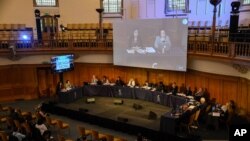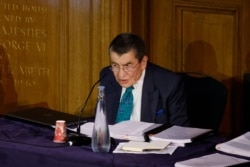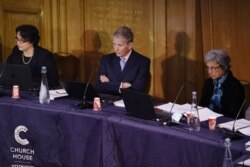Human rights activists and Uyghur experts have welcomed a "people's tribunal" initiated in London last week to probe whether China's alleged crimes against the Uyghurs amount to genocide, stressing the need for more practical action from the international community.
A nine-member panel, made up mostly of lawyers and academics and chaired by prominent lawyer Geoffrey Nice, held its first set of hearings in the "Uyghur Tribunal" June 4 to 7 to investigate allegations of China's mistreatment of the Uyghurs in Xinjiang.
China, which denies mistreating Uyghurs, scoffed at the panel.
According to Luke de Pulford, the U.K.-based human rights campaigner and founder of Coalition for Genocide Response, the tribunal is not endorsed by the British government but could prompt more direct action from authorities.
"We need to pick a side. Will we defend our values or sell out to China? We can't do both," Pulford told VOA.
In April, British lawmakers unanimously declared the Uyghur crackdown a genocide, thereby joining the United States, Canada, Netherlands and Lithuania in condemning China's actions.
However, the government this week reportedly rejected a proposal from British lawmakers that would prevent U.K. companies from using products made by Uyghur forced labor.
China denies mistreating Uyghurs
Dolkun Isa, the president of World Uyghur Congress and one of the witnesses at the tribunal, told VOA that Uyghurs have long fought for a day in court and now they can finally tell their stories.
"The tribunal is an essential body to document all the evidence pertaining to the Uyghur crisis," Isa said, adding that he hopes results stemming from the panel will provide another incentive for governments around the world to find the political will to take appropriate action to hold China accountable.
The tribunal considers itself an alternative in the absence of an international legal body investigating the alleged crimes. Its second set of hearings will take place in September, and a final ruling is scheduled for December.
Jurisdiction issues
Last December, the International Criminal Court said it would not investigate the case because it was outside its jurisdiction, as China was a nonmember state. And the International Court of Justice investigates only legal disputes between states submitted to it by them and provides advisory opinions on legal questions at the request of the United Nations and certain agencies.
"The Tribunal has always made it clear that it would not have been formed if there was a possibility of the allegations being considered at a formal international court," the Uyghur Tribunal stated on its website on Wednesday.
The organizer of the tribunal, London-based businessman Nick Vetch, said in a video before the first round of hearings that the proceedings can, to some degree, do what formal courts should be doing.
"(Uyghur Tribunal) can provide a body of evidence that is indelible and available to posterity," Vetch said.
During the hearing at the headquarters of the Church of England, nearly three dozen witnesses and experts appeared in person and virtually. They testified about internment camps, persecution, forced labor, torture, rape, the compulsory sterilization of women and forced contraception, forced separation of children from their parents, destruction of cultural and religious heritage, and organ harvesting by Chinese authorities against Uyghurs and other Turkic groups in Xinjiang.
Among the witnesses was former Chinese police officer Wang Leizhan, who was among some 150,000 Chinese police recruits sent to Xinjiang in 2018. He told the panel that the police engaged in arbitrary arrests, torture and forced confessions while denouncing the faith of Uyghurs.
"When I arrived and I went on my round, we arrested around 300,000 Uyghurs," Wang told the panel, speaking remotely in Germany, where he sought refuge in 2020.
"The reason for these arrests included that they might have had a knife at home or because they were showing their cultural identity, or they were somehow considered to have a different ideology," Wang said, adding that in some villages, the entire local population was taken to camps.
China responds
Chinese officials deny accusations by some countries and rights groups that it is holding over 1 million Uyghurs in internment camps while subjecting many others to forced labor around the country. Beijing says it provides "vocational training" and "poverty alleviation programs" aimed at helping Uyghurs become better citizens.
During a press conference in Urumqi, China, Wednesday, Elijan Anayit, a spokesperson for the Xinjiang autonomous government, called the tribunal a pseudo court lacking authority.
"The hearing is a serious violation of international law and order, a serious desecration of the true victims of genocide, and a serious provocation to the 25 million people of all ethnic groups in Xinjiang," Anayit said.
On Thursday, Amnesty International, in a new report, accused China of "massive and systemic abuses" against the Uyghurs under the guise of fighting terrorism.
"The government has devoted tremendous resources to concealing the truth about its actions," the 160-page report said, adding that China prevents millions of people living in Xinjiang from communicating freely about the situation and denies journalists and investigators meaningful access to the region.






